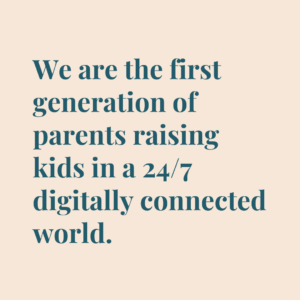I witnessed something this past week that has caused me to think about the time we spend with our children, and the importance of everyday moments.
While standing in line at the counter of our family’s favorite pizza place, waiting for our take-out order to be ready, I noticed a little girl and her parents walk into the restaurant and sit down.
The girl was probably around 5 years old, and she smiled widely at me as they walked past. My pizza was taking a while, so I had the opportunity to stand and watch this family out of the corner of my eye.
They sat in a booth together, the little girl next to her father and across from her mother. After ordering their drinks, both parents immediately pulled out their cell phones. The father was pressing buttons with his phone to his ear, apparently listening to voicemail messages. The mother was fiddling with the buttons on her phone while looking at the screen. I watched as the little girl sat there silently looking around the restaurant, then back at her parents. She intermittently sipped her drink, kicked her shoes off and then put them back on, and at one point handed her glasses to her mother to have them cleaned. Her mother set the phone down long enough to wipe the glasses with a napkin, and then promptly devoted herself to the phone once again. The only other time I observed the parents to pause their interactions with the cell phones was when the server came to take their order. As soon as the server left the table, those cell phones were back in hand again.
I watched this go on for 15 minutes as I continued to wait for our pizzas, and the same scenario was still occurring as I left the restaurant with pizzas in hand. There was a part of me that wanted to go over to the table, grab those cell phones, and make the parents look at their little girl. That, coupled with a lecture about the importance of relationships and engagement in the development of children, would have made me feel much better! I resisted the urge, however, and instead thought about this sad commentary on our society and how we define “spending time” with our children.
These parents might be wonderful in many respects. I have no idea who they are or how they live their lives, except what I observed for that series of moments in the pizza place. What I do know based on that limited observation, however, is that they were so consumed with themselves in those moments that they missed an opportunity. They failed to engage with their daughter who, although seemingly invisible to them, was right there at the same table. While they were spending time together, the time was void of meaning and connection. It was the epitome of being together, yet completely alone and isolated from each other.
“Together” in this scenario could be defined only as physical existence in the same place at the same time. It was not a “together” that included the connection of minds, emotions, thoughts, and ideas. Their version of “together” might be eligible for a prize in multi-tasking; but it fails miserably as an effort to raise a competent, thoughtful, emotionally healthy child. I have to wonder if this child is perpetually letdown by these kinds of experiences with her parents: excited at the prospect of spending time together, only to be disappointed by neglect. Or is she so used to being isolated in their “togetherness” that this is how she has come to view relationships with her parents and others? Either way, it is sad to think of a child living this experience; and yet I know there are so many children everyday who encounter the same reality.
Spending time with a child needs to encompass much more than being in the same place at the same time. We all have many moments during the day when we are with our children, but are not really engaged with them. That is par for the course in parenthood, as we cannot spend every waking moment fully engaged and connected with them. However, if the majority of our time with them is spent multi-tasking, half-listening, and barely doing more than meeting needs—then we have to stop and consider how we really view spending time with our child. The time we spend with our children doesn’t have to be exciting or elaborate to be meaningful. Here are some ways to foster engagement in everyday moments of togetherness:
1. Make the most of “out and about” moments
Whether in line at the grocery store, sitting in a restaurant, or driving in the car together, there are many moments throughout the day when we are out and about with our children. These times provide excellent opportunities for capitalizing on a captive audience (your children are there with you, and really can’t go/do anything else) and connecting with your child. Talk about some things you are both looking forward to later in the day or week, make up stories together, play “I Spy,” color a picture on the back of the placemat, hum favorite songs, or just make silly faces at each other! Use these moments when you are physically together with your children to be together mentally and emotionally as well.
2. Create simple moments
Building and nurturing relationships with our children can be done in endless small and simple ways. Sometimes as adults we get caught up in thinking that “bigger is better,” and that in order to have quality time with our children we have to set aside a big chunk of time and do something exciting. Most of the time, simple is better when it comes to our children! Take a walk around the block, read a book, toss a ball back and forth, or have a snack together on the floor like a picnic. These things may not strike us as special, but to children they carry great meaning and allow us to be together and connected with them.
3. Get it done moments
There are many things we have to get done in the course of a day or week, and most people’s list of “to do’s” around the house include things like cleaning and yard work. How often do we leave our children to do something else, such as watching television, while we tend to these chores? Spending time together with children in accomplishing these tasks provides innumerable opportunities for engagement on many levels—allowing us to think, communicate, socialize, and share emotions with each other.
4. Stop and listen moments
We want our children to listen to what we have to say; but how often do we take the time to really listen to what they are saying? It’s unrealistic to think that we can always be 100% attentive to what our children say to us. However, if we are constantly in a multi-tasking mode while they are speaking then we miss opportunities to be connected to them. Stop for a moment and really listen to the story about something sad that happened on the playground, or the newest art project. Be physically, mentally, and emotionally engaged with your children in those moments, regardless of how brief they may be.
The time we spend with our children is a precious commodity. Time spent together can be meaningful or isolating, and either way it significantly impacts our children. Recognizing the importance of daily moments of togetherness for fostering the relationships we have with our children is critical for their social, emotional, and cognitive development. We cannot become so wrapped up in our lives that we mistake physical togetherness for the togetherness that creates and maintains a connection between us. Engaging our children while we’re out and about, getting chores done, taking a walk, or stopping to listen allows us to make the most of the moments we have together.
What You Should Do Next:
Sign up for my Better Behavior Naturally community newsletter
Sign up for my newsletter to get tips, resources, and supports to improve your child’s attention, anxiety, mood, and behavior…while making your job as a parent easier.
Enroll in one of my workshops
Check out one of my many workshops where you’ll join my exclusive community of parents in a one-of-a-kind virtual resource accessible 24/7. Whether you’ve got a child with a diagnosis like autism or ADHD, or are becoming more and more frustrated with a child who struggles to listen and cope, these workshops are designed to give you the information, tools, and support you need…whenever you need it.








